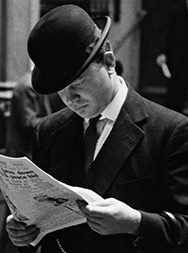Posts Tagged ‘accents’
The Rain in Spain and all that
In April 1962, fresh off the boat from New Zealand, I stood on a railway platform in Southampton, on England’s south coast. All around me the sound of voices, English voices. In notes written a few days later, and saved in my old black filing cabinet, I wrote:
Railway platform – probably much the same as those in NZ, but had a sense of Englishness about it – hard to define, but probably due to the language spoken – correct English accents as if they were the most normal thing – this takes a bit of getting used to. … Here on the Southampton platform we heard the ‘jolly hockey sticks’ manner of speech for the first time. In all cases, it is difficult to distinguish in the mind between the real thing and the caricature which up to now is all we have known. The same with men in bowler hats and umbrellas.
Reading these notes fifty-three years later, I see in them the ambivalences and ambiguities that filled my formative years. Europeans had been in New Zealand for scarcely a hundred years. From the industrial ferment of 19th century Britain, the English, Irish and Scots immigrants brought a legacy of radical socialism, and from the obduracy of the land they grew a people that glorified the strong men, the rough, the plain-spoken, and left to its women the care of the arts and the domestic hearth. For my father and his friends, a man was considered useless unless he was good at working with his hands. An Englishman, especially if he had a “posh” accent, was teased about being a “Pom” and eyed with suspicion until he could prove himself as one of the blokes.
On the other hand, well-spoken Englishwomen dominated the social life of the resort town where I grew up. English bone china teacups clinked in parlors where pictures of thatched cottages might grace the walls, and genteel conversation was made about making the trip “Home” to the old country.
Prejudices about accent can cut both ways. The longer I stayed in England, the more I realized that how one speaks was critically important in that class-bound society. I quickly dropped all the Kiwi slang I ever knew. But, unlike Eliza Doolittle in “My Fair Lady,” I could not get my tongue around the inflections and tonalities that signified “proper” English. My accent slotted me into a pigeonhole labeled Colonial, from which I could escape only by leaving.

